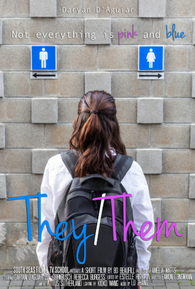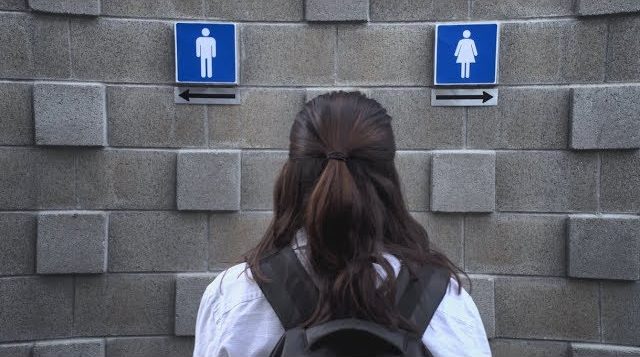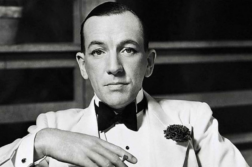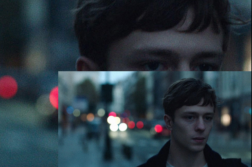
Now, please buckle in as I review They/Them, as it was, well – a lot. I only mean this in the best way. They/Them is even subtler than Still Me and even more melodramatic. It is the longest of the films I’ve written about in this series of reviews (see Part I published on this blog last week), coming in at just under twenty minutes, but was my sentimental favorite of the bunch, which is interesting, considering it is also definitely the most flawed.
 They/Them
They/Them
Bo Beaufill, dir.
They/Them stars Daryan D’aguiar as Ash, an angsty teenager (think Billie Eilish, but even queerer) from Auckland, New Zealand struggling with gender dysphoria. The film is largely centered around an English class at Ash’s all-“girls” catholic school. After a new girl is introduced to the class and asks the teacher to change her name from “Charlotte” to “Charli” on the roll call sheet, Ash politely requests that the teacher change their name on the roll sheet from their deadname to Ash. The teacher rejects this request, telling Ash that they need to “legally” change their name before it can be changed on the roll. Overhearing this, some of Ash’s classmates, including the redheaded antagonist Dominique, call them names like “tranny.”
Whereas the bullying and rejection faced by Bailey in Still Me is largely implicit and quiet, They/Them finds Ash experiencing the explicit, noisy kind. Not long after the roll sheet incident, Ash is pushed against a locker. Later, as Ash is practicing alone for a poetry presentation they are to give in their English class, Dominique and her friends sneak up by the door and film them, planning to humiliate Ash on social media.
The footage elicits many negative, transphobic comments. The whole ugly episode leads Ash to ask their mom for makeup and they (singular) resolve to present more “feminine” to quell the bullying and satisfy the fragile conceptions of their bigoted schoolmates.
Now presenting as “feminine,” Ash attends a house party thrown by a popular classmate. At this party, Ash gets drunk and dances with a facial haired “fuckboy.” Afterward, Ash broods alone outside, only to be joined by Charli, the new girl in the English class introduced at the beginning of the film. Ash initially wants nothing to do with Charli, but comes around when she comes out to them as gay, and tells Ash that they are inspired by their ability to be themself despite the bullying. Ash’s confidence falters again, however, when Ash tells Charli about a friend who is “non-binary.” Ash scoffs, saying that the way they personally feel about their gender makes them want to “die” because of all of the external pressures.
Back home, Ash tries to convince themself in a mirror that they are a woman, but one can sense the lack of commitment.
The final scene of the film is its longest – the day of the poetry presentation in the English class. The bully Dominique goes up first and reads her hilariously bad piece (it begins with the “Roses are Red, Violets are Blue…” cliche). When Ash goes up to perform, they are continuously heckled by Dominique, even as Charli attempts to intervene and defend Ash. Enraged by Dominique’s bullying, Ash finally tears up the poem they are reading (which is about being a woman) and recite from memory their non-binary poem. To watch Ash deliver this poem with such ferocity, defiance, and confidence is awe-inspiring.
“Every time someone calls me she,” they say. “My stomach turns and my skin feels thick, like someone raised a panic alarm in my brain.”
They/Them, like Still Me, is directed toward a teenaged and pre-teen audience and is not subtle. An example: after the scene in which they are thrown against a locker, Ash runs out of the classroom and stands before two gendered bathroom doors before shaking their head and sprinting off back home. Not exactly textured, layered symbolism. But with one exception, this lack of subtlety is generally not a hindrance to the film. In fact, there were scenes in which it worked in its favor.
The one exception that did not work for me was the film’s ending. Without giving it away, I felt that it affirmed a kind of binary, pro-establishment mentality that the film had been rejecting up to that point. I had thought that the whole point of the film was that Ash didn’t need external validation to live their truth, so I was wondering why external validation was what they were uncritically awarded with in the end.
On the other hand, the film’s antagonist and, truly villainous Dominique, really stole the show for me. She is a truly detestable character and behaves grotesquely and cruelly throughout the film. I couldn’t help but laugh at her cartoonish Mean Girls transphobia routine and her goody-two-shoes, smarty pants New Zealand affect. She immediately became my least favorite and favorite character of not just this film but of the three films I watched. She just represented the bigoted energy so well – a bit like John Turturro’s character in Do The Right Thing. Kudos to Rebecca Burgess, who portrayed Dominique.
***
Transness and gender-queerness remain violently misunderstood and dismissed as cis-gender heteronormative binaries are upheld. The three films in these reviews highlight the danger of this while providing potential solutions on how to think about and battle it. In Still Me, Zach shows Bailey the power of community and self-confidence in being seen and battling bigotry. In Labels, Sky seems to come to a brave conclusion that internal validation is sometimes all you can rely on in an exhausting, cis-gendered world, particularly when you are in a non-queer space. And in They/Them Ash meets bullying, bigotry, and violence with a powerful reclamation of their body and identity.
I did not invoke a film like Spike Lee’s Malcolm X for no reason. Far beyond just the film, the real Malcolm was so effective and forceful as an activist because he challenged the superiority complex white people felt (and feel) about black people and demanded the right for the latter to be seen, heard, and felt. He encouraged black people to embrace their beauty and power while unflinchingly describing their plight:
“… Malcolm has great authority over any of his audiences,” said James Baldwin in a televised interview in the early 1960s. “He corroborates their reality. He tells them that they really exist!”
In other words, Malcolm invoked pride. Unapologetic pride is a profoundly dangerous weapon in the face of hate, whether passive or active. It says to passive attitudes: “I am here! Do not look away! I am equal to you!” and it says to actively hateful attitudes: “I am here! And I will fight you! If you cannot see me as your equal, I will make you!”
Each of these films demonstrate this kind of subversive pride for queer, trans, and non-binary audiences, no matter how young or old. As much as they address dysphoria, they are in the end euphoric – especially Still Me and They/Them. As someone who struggles with dysphoria, it was indeed a moving experience to both – paraphrasing Baldwin – see a corroboration of my reality, and uplifting visions of gender euphoria and pride.

Toby Jaffe is a writer from New Jersey whose work has been published in The New Republic, American Prospect, Paste Magazine, and The New York Review of Architecture. Follow them on twitter at @JaffeToby.






